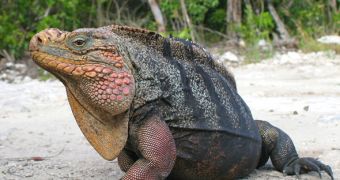Researchers writing in yesterday's issue of the journal Conservation Physiology maintain that, although they mean well, tourists that feed iguanas living in the Bahamas more often than not harm these animals.
In their paper, specialist Charles Knapp with the John G. Shedd Aquarium in Chicago and his colleagues detail that, in order to determine how the presence of humans affects northern Bahamian rock iguanas, they assessed the overall health condition of lizards living on both tourist-visited islands and on non-tourist-visited islands.
As detailed on EurekAlert, the researchers went to these islands in 2010 and 2012, and collected blood and fecal samples from male and female iguanas.
Information obtained by analyzing these samples allowed them to determine the animals' health condition.
It was thus discovered that, when compared to lizards living on non-tourist-visited islands, the iguanas that had regular contact with humans had different levels of glucose, potassium and uric acid in their bodies.
What's more, the endoparasitic infection rate among these reptiles was one of 100%, and many of the animals suffered from diarrhea.
The scientists suspect that these differences stem from the fact that iguanas fed by tourists consume more sugary fruit, especially grapes, the same source tells us.
Interestingly enough, the most notable differences were recorded among male iguana populations. All things considered, this is probably because male and female iguanas behave differently at meal times.
“Both sexes on visited islands consume food distributed by tourists, although male iguanas are more aggressive when feeding and eat more provisioned food.”
“Consequently, they may be more impacted by provisioning with unnatural foods, which could explain the greater suite of significant physiological differences in males between populations,” explains specialist Charles Knapp.
Since the northern Bahamian rock iguana is currently in danger of going extinct, the researchers are not saying that tourists should stop feeding them altogether.
They do, however, recommend that local wildlife rangers offer people visiting these islands special iguana food and ask them to give this to the animals instead of whatever treats they are carrying in their pockets.
“The biological effects of altered biochemical concentrations may not be manifested over a short time period, but could have deleterious effects on long-term fitness and population stability.”
“The complete restriction of feeding by tourists may not be a realistic option. Instead, wildlife managers could approach manufacturers of pelleted iguana foods and request specially-formulated food to mitigate the impact of unhealthy food,” Charles Knapp says.

 14 DAY TRIAL //
14 DAY TRIAL //